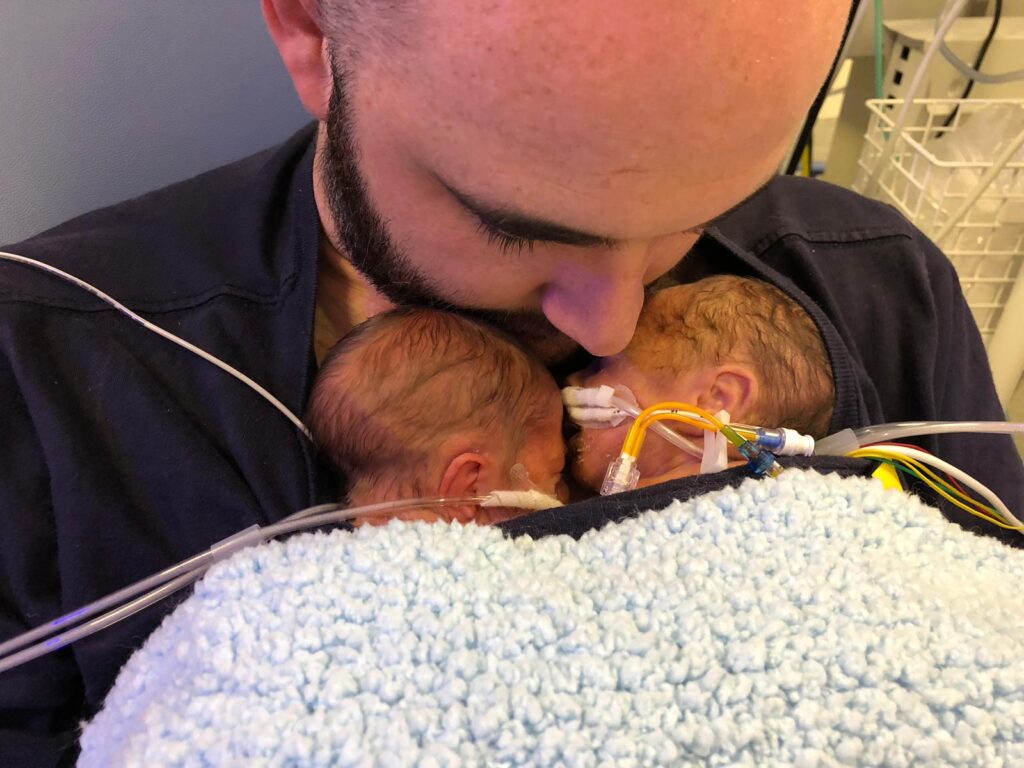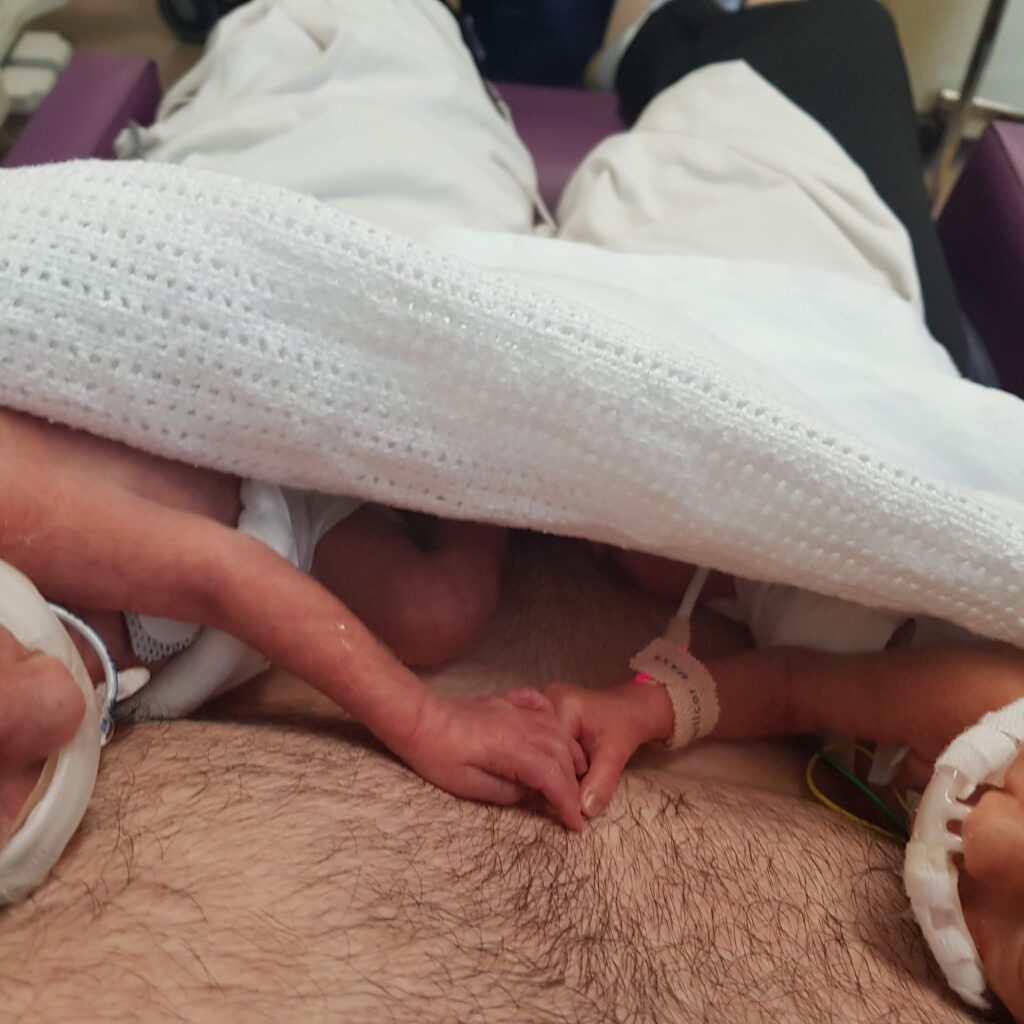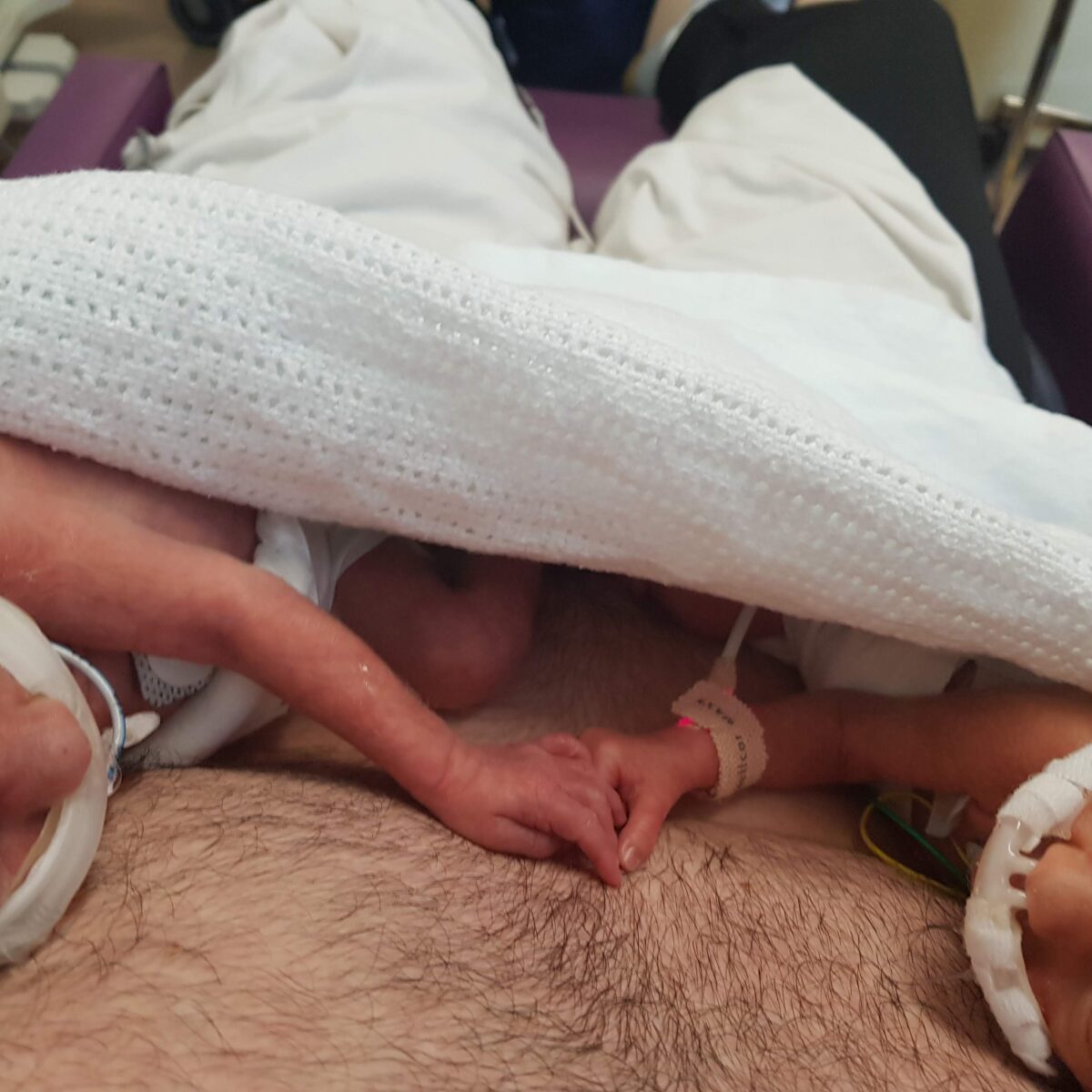I thought I’d taken a wrong turn and ended up in a zoo.
Man, I was confused. I thought this was a hospital for sick babies. Why were we talking about animals?
What the hell is kangaroo care?
Turns out it’s a really important part of the neonatal journey – both for parents and baby. And while it’s essential for mums to take part, it’s also something that dads can participate in… and we even bring our own benefits to the party.
Here’s how…

What is kangaroo care?
Kangaroo care is a way of holding a baby which is popular in neonatal units. The baby is placed on the parent, crucially with skin exposed to allow skin-to-skin contact. Often, the baby will be placed down the top of the parent or underneath a blanket to keep them warm. The hold effectively mimics the way a mother kangaroo carries her joey in a pouch at the front – hence the name ‘kangaroo care’.
Babies requiring neonatal care are often separated from their parents immediately or soon after birth. Kangaroo care is encouraged in NICU units as a way for parents – particularly mothers – to build a rapport with their newborns. This can help to regulate the mother’s hormones and to stimulate her milk supply.
However, dads should also be included in kangaroo care, for several reasons.
Fathers can – and should – be included in kangaroo care
What are the benefits of kangaroo care for babies and dads?
I can’t deny that the nine weeks in which my sons were in neonatal care were the most difficult of my life. However, looking back I relate the periods of kangaroo care and skin-to-skin contact to positive memories of the experience. These were the few times that I was able to cherish, in spite of the circumstances.
So, how does kangaroo care between dads and babies help both parties?
It helps dads to bond with their babies
Bonding with your baby in NICU is hard. It’s not just a case of cuddling them and comforting them whenever you want – instead, you have to ask permission to hold them. You have to read through an incubator porthole instead of whilst cradling your child. You feed them through a tube instead of by a bottle.
But kangaroo care is a great way to build the father-child relationship. I relished every opportunity to hold my sons – either one at a time or together – as I felt it helped me to begin making that bond and effectively get to know them. A study backs this up, finding that skin-to-skin contact can help fathers feel more attached to their babies.
Kangaroo care is a great way to build the father-child relationship. I relished every opportunity to hold my sons.
It helps to grow dads’ confidence
I’m sure I don’t speak for all men here, but for me there was certainly a degree of nervousness about learning how to be a father. For example, how would I protect my sons, or soothe them and comfort them?
Kangaroo care, and having that early skin-to-skin contact, helped to ease my nerves and begin to learn the cues that my sons would give. This in turn meant I was better prepared and more confident in providing care.
Indeed, research has found that skin-to-skin can help to develop caring behaviours and increased sensitivity towards parenting in fathers.
It helps to settle baby’s heart rate
Particularly in pre-term infants, heart rates can be erratic – I remember watching with abject concern as my sons’ monitors beeped wildly at the endless swings between too many and too few beats per minute.

Skin-to-skin contact has been shown to help stabilise neonatal infants’ heart rates and reduce respiratory distress – both with mothers and fathers.
It helps regulate baby’s temperature
Additionally, kangaroo care can with both parents can benefit the baby by helping them to regulate their body temperature. Babies born prematurely often need to be placed in incubators which are heated to body temperature, as their bodies are not sufficiently developed enough to maintain the correct temperature.
Skin-to-skin holding with parents can help the baby to develop this ability to regulate their temperature during the care. A study also found that kangaroo care with fathers was just as effective as with mothers in terms of baby’s temperature regulation.
It helps to soothe and comfort your baby
Studies have also shown that father kangaroo care can contribute to soothing and comforting babies in neonatal care. I vividly remember holding my sons for the first time, and being apprehensive as they cried faintly as the nurses moved them from their incubators. But as soon as they were comfortable on my chest, they stopped crying and became content.
It’s thought that the rhythm of the parent’s heartbeat acts as a comfort and helps to reassure the baby.
It helps you both to relax
A further (and highly important) benefit of kangaroo care is that it can help both baby and father to feel relaxed and reduce stress levels. For babies, studies suggest that skin-to-skin contact contributes to decreased stress levels and reduced responses to pain.
A review of studies found that fathers experienced higher oxytocin (a hormone linked to love and care) levels and reduced levels of the stress hormone cortisol, both during and after skin-to-skin holding.
It helps the dad’s relationship with the mother
I’ve spoken previously about just how much of a strain having a baby in NICU can put on a relationship. Though it was tense at times, my wife and I made it through together – and that may in part be thanks to kangaroo care.
The review of skin-to-skin care studies mentioned earlier also suggested that fathers who take part in kangaroo care go on to develop stronger relationships with the mother of the baby.
Building lifelong bonds
To recap, there’s absolutely no doubt that having a baby in neonatal care is difficult. But amid all the angst and pain, kangaroo care really was a lifeline for me and, I suspect, many other fathers.
Though it was a heart-warming experience at the time, I firmly believe that I continue to reap the rewards of taking part today – my sons are now two years old and I have an unbreakable bond with them. That’s something I might not have had if I wasn’t able to hold them close during their dark early days.
Finally, if you or someone you know currently has a baby on a NICU or SCBU unit, check out my free checklist with helpful tips on how to bond:
